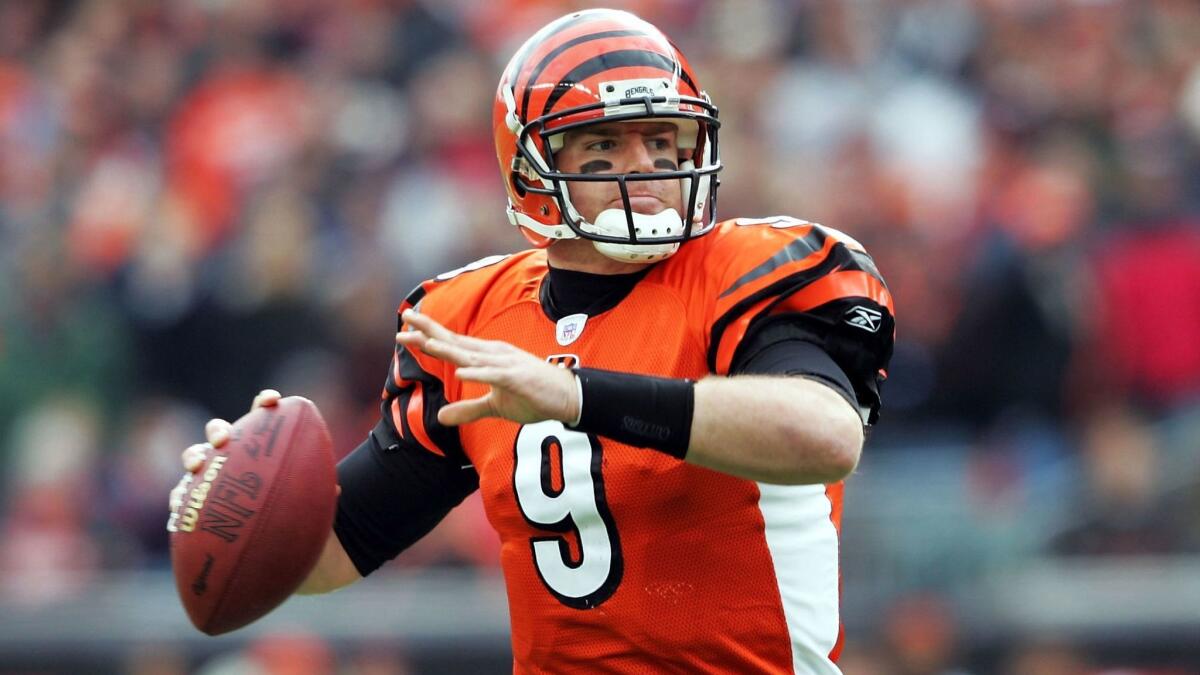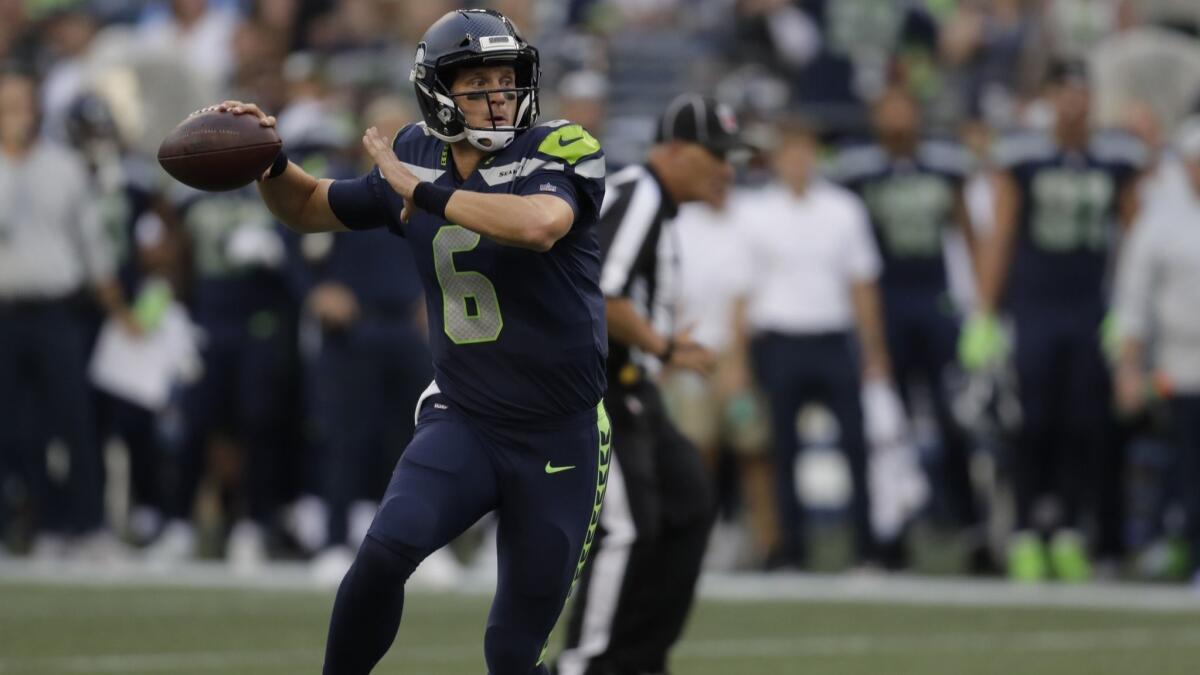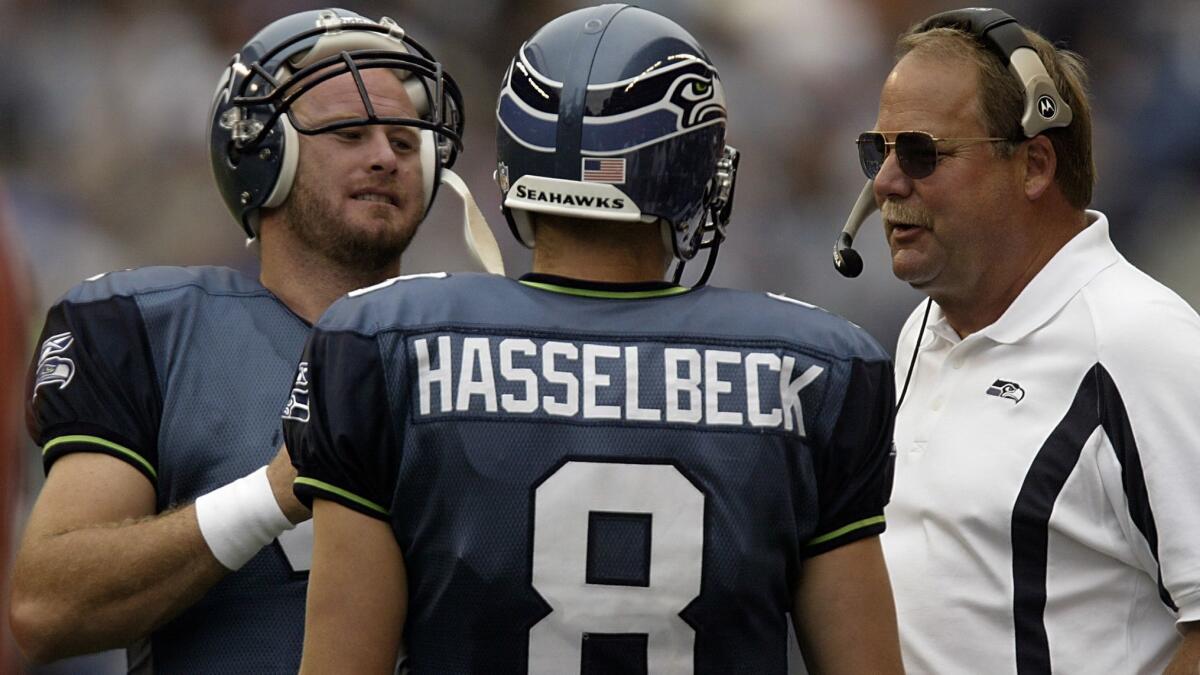Former and current NFL players discuss their experiences in the quarterback room
Jim Zorn could still put heat on his throws, years after his career as an NFL quarterback was over.
Just ask Trent Dilfer.
“I had Jim Zorn throw a clipboard at me in a meeting because I called him out on something,” recalled Dilfer, who had Zorn as a quarterbacks coach in Seattle.
That’s less a story about Zorn and more a story of the intensity of an NFL quarterback room, where Xs and O’s come to life, tempers occasionally flare and lifelong friendships are forged.
“Jim was like a father figure to me,” said Dilfer, who was with fellow Seahawks quarterback Matt Hasselbeck at the time. “Matt was like, ‘Oh my gosh, how could you say that?’ And I was like, ‘Because it was wrong. We’re not in the business of being wrong. We’re in the business of winning. And when I’m wrong, you guys better call me out.’”
Like most flare-ups in the quarterback room, that one dissipated quickly.
Good quarterbacks have a short memory.
“My kids were being babysat by his kids a day later,” Dilfer said. “We’re at his house for Thanksgiving playing 50 states games, we’re in Bible study together. This is how we are. This is what we do. We know what conflict looks like. We know how to deal with it. And we move on and get better from it.”
That’s life in an NFL quarterback room, a cozy command center where the team leader, his backup and the third-stringer not only install a game plan for the week but also confidentially hash out all sorts of problems that arise on a team.
To get a peek inside that private room, The Times collected first-person accounts from several sources: Troy Aikman, Hall of Fame quarterback for the Dallas Cowboys; Carson Palmer, the Heisman Trophy winner from USC who retired this year after 15 NFL seasons; Hasselbeck, who played 18 season and, like Palmer, made three Pro Bowls; current Seahawks backup quarterback Austin Davis; Rick Neuheisel, former UCLA quarterback and coach, who was both a quarterbacks coach and offensive coordinator in the NFL; and Dilfer, who played 14 seasons with five teams, winning a Super Bowl ring in Baltimore.
Aikman
There’s information that’s shared in the quarterback meeting room that’s simply not shared in any other room in the building. It’s personnel. Maybe why this player was released. Could be issues within a staff. I heard it all in Dallas, and I don’t think it was anybody saying something they shouldn’t say. It speaks to the importance of the quarterback.
If you’re talking about Tom Brady, Aaron Rodgers, Drew Brees, they’re privy to a lot of information, and they’re viewed as much as an executive as they are a player, and rightfully so. These guys should have a hand in a lot of decisions that are being made. I was. Not that I was always consulted as far as, “Hey, tell us what we should do.” It wasn’t one of those things. But, “Tell us what you prefer. Tell us your thoughts on this.”
I would be asked sometimes before the Cowboys would look at a quarterback to bring in, “Hey, what do you think of this particular guy?” Because there’s so much time that’s spent in that room, it’s imperative that everybody is on the same page and understands exactly what their roles are.
I had a great room for the most part. I wouldn’t say it was always great. But for much of my career, at least the last two-thirds, the meeting room for me was good.
You want ideas. You want to hear from the other quarterbacks in the room, even though they’re not going to be starting. When he was my backup, Jason Garrett was great at coming up with some things. But before he ever presented it to the coordinator, whether it was Norv Turner or Ernie Zampese, he would run it by me. He would say, “What do you think about this?” Sometimes I’d say, “Hey, it’s great. I really like it.” There were other times I’d say, “Nah, I’m not for it.” And then that would be the end of it.
What I expected was that if I voiced something in a meeting, I expected the other quarterbacks in the room to support that. That was real important.
For instance, if something’s going into the game plan and I’m not happy about it, I don’t like the philosophy that we’re going into the game with, and I express that, then I’m the one that has to go take the snaps. I’m not interested in hearing someone else in the room telling me, “Hey, I think you’re wrong.”
I was all for ideas, and all for a discussion. But once I kind of determined what I was willing to do and what I didn’t want to do, then I expected full support. And I got it.

Palmer
Every quarterback room is different. In mine, I wanted as much info as I could get. I always loved involving the third-string quarterbacks and the practice-squad quarterbacks who had just gotten released from, maybe, the Chargers’ practice squad, and we picked him up before we’re playing the Chargers. You know, asking about this corner, “Can this guy run? Does this safety have good ball skills? If I throw a 50-50 ball, will he be able to find it?” Just little tidbits.
I know certain quarterbacks don’t want to hear a word from anybody else in the room. To each his own. Everybody’s got a different way to prepare and how they want information to be fed to them on Wednesday, Thursday and Friday.
But I got useful information from guys all the time. I loved signing a quarterback late in the season, where three weeks before that he was in Green Bay. I loved those opportunities, because those guys were the ones that practiced against the starters, so those guys are trying to make the team, trying not to get cut, know that, “Hey, if Patrick Peterson’s on the right side of the field, I am not throwing to the right side.” Or, “This guy is overrated and I threw at him every day in practice.”
Those guys were so scared to give the starter bad information that I always felt good about what they told me. If a kid was going to speak up, “Hey, Carson, they just cut me last month and I’ve got no grudges, but that safety is terrible.” Or, “That linebacker can’t cover David Johnson. There’s no way. He couldn’t cover me.” Those pieces of information were huge.
And I never felt like a kid was going to steer me the wrong way because he didn’t want to be wrong. They don’t want to get cut again, pack up their room. If somebody’s willing to put a stamp on it, put their name on it, then I’m going to take it for what it’s worth.
Hasselbeck
If you’re not the starter but you want to give a piece of information to him, you’d better make sure you’re right. I gave a tip my rookie year about Pittsburgh safety Carnell Lake being too hurt to play in a Monday night game, Packers-Steelers. I had a really good friend on the Steelers, and he told me, “Listen, Carnell Lake’s not playing. He’s on crutches.”
Here I am, I want to contribute to the team. I tell Doug Pederson, Brett Favre, Andy Reid, Rick Mirer. I’m like, “Guys, I’ve got the scoop. Carnell Lake, not playing.” And he’s a great player for the Steelers.
We go to “Monday Night Football,” we’re in Pittsburgh, warmups. Carnell Lake looked outstanding. They looked at me like, “Don’t ever talk.” I felt awful. Either my friend totally played me — which happens sometimes — or Carnell Lake had this miraculous recovery.
So you’d better be absolutely, 100% sure.
In the quarterback room when I was in Green Bay my first year, I was allowed to be in the room while Mike Holmgren and Andy Reid coached Brett Favre. That’s kind of how I looked at it.
It was like I got to sit in the Harvard Business School lectures for a young quarterback in the NFL. If I was going to add value, it was simply in trying as hard as I could.
I remember a conversation when Brett Favre said to me early on, he said it to all of us but mostly me because I was new. He said, “Listen, y’all try to compete with me. Try to be the best. That will just make me better and make us all better.” I think my reaction was like, “That’s the silliest thing in the world. How can we compete with you? You’re like the best of all time.” But that was the mind-set of the room. Like, “Hey, let’s all be great. Let’s all be as great as we can be.”
It’s not just players in the room. A lot of times you’ll have a quarterbacks coach, and an assistant quarterbacks coach. If you need to ask a question, instead of bothering the starter, you might ask the assistant quarterbacks coach. He’s like a teaching assistant.
If you’re in a microeconomics class in college, you’ve got a grad school kid where you can go, “Hey, I didn’t understand how the professor said that. Can you say it a different way?” And it’s like, “Yeah, yeah. Don’t worry about that. Here’s what you need to worry about.”

Davis
It starts with the starter and his personality, what he wants. Everyone in the room is there to make him successful. If the quarterback’s playing well, you’ve got a chance.
For me, with Russell Wilson, that can come in the form of encouragement. That could be Xs and O’s, side projects, watching extra blitzes. Being able to talk the game with him, maybe something he didn’t see but mentally he can hear it and process it.
Then there’s the competition part, which is, “Hey, you’re the starter, but I’m here too. And if I’m making that play, you need to make that play.” You can push them that way too. All great players want that.
The competitiveness you feel, that’s the hardest part of the job. It’s something that I really struggle with sometimes, honestly. Because there’s more dynamics when it comes to the quarterback room. It is a business, and there’s a lot to it. But you also realize that to be a No. 2 in this league you’ve got to be in the top 64 in the world, so you have to step back and gain some perspective, take in the big picture, be a servant and know that you’re only one play away.
If Russ goes down and you’re in the game, no one cares that you’re a No. 2 anymore. No one cares that you haven’t had any reps. All they care about is if you can perform.
Neuheisel
Normally the quarterback room has a pure starter. There’s a guy that’s clearly the guy. When that’s the case, then everything else in the room revolves around getting him ultimately prepared. Sometimes that’s a backup that’s going to bring questions to light that will benefit the starter. That’s how the backup became the backup. He’s a cerebral guy.
I think of Jason Garrett and Troy Aikman in Dallas. There’s a real bright guy — not that Troy isn’t bright — but a guy that got in the league strictly based on brains. So he brings things up not so much to one-up the starter, but to help the starter. To point out things that become part of the plan.
But it really is the most beneficial when the roles are clearly defined within the quarterback coach, the coordinator, the starter, backup and third-teamer. If those roles are defined, the participation in the meeting will all lead to benefiting the starter in a positive way. When those roles are not defined, then what can happen is people will add in or weigh in at different times, and it ends up making the topic more murky.
The ultimate situation would be a starter who’s got a little experience, and the backup might be an older guy who’s just lending experience, lending some know-how not just about the outside linebacker but, “That outside linebacker used to be on my old team, and here’s what he does.”
And the third-teamer, that’s a young guy, an apprentice. We all say we learn more when we teach. So the starter is teaching the youngster and becomes better at what he does. That to me is the ultimate perfect triangle in the room.
Then a quarterback coach that knows intimately every nuance, and works on the details and the fundamentals, everything that goes into it. And then a coordinator who comes in and basically explains situationally what we’re doing. But the voices never conflict.
I’ve been in tons of bad quarterback rooms. The Rams had 50 guys talking to Jared Goff when he was a rookie. All he wanted to do was learn, “How does this apply to my experience at Cal? So I can use those positive experiences to my benefit?” Because every language you learn, you learn it juxtaposed to the language you used to have. Because at the end of the day, it’s who to throw to, and when to throw it to him.
All the language that guy hears has to be like, “OK, this is like when you were at Cal doing this.”
If I have five guys come in here changing what this guy said, I’m not going to know which way is up.
I told Sean McVay when I met him at the combine before he started coaching the team, “Goff is great, but you’d better be the only one talking to him.”
You can’t have somebody saying, “Hey, what he said, think about it this other way.”
You can’t undermine what was just said. Then you get personality conflicts within the room, and that’s another problem.

Dilfer
I’m a big believer that your No. 2 has to be about “we” more than “me.” Even if he’s still competitive, even if he wants to be a starter one day, that’s cool. You want that. But that guy has to be about the team, like, “I’m here to serve the team.” And at the same time — and it’s what most people can’t comprehend — you can do that and still be an assassin. You can do that and when you’re given the ball say, “OK, it’s on now.”
It’s a very, very important position on the football team. It’s a dichotomy, where I can serve you and serve the team, but don’t get me wrong, I’m waking up every morning with the hair on my arms standing up saying I’m going to get better, and I’m going to be a star one day. I’ve got a bunch of touchdowns and a bunch of wins in this body. Just now is not the time.
You have to make sure you’re bringing a good vibe into that room. Don’t be an energy vampire. Be a guy that brings it. And if you do that enough, even if the other guy’s a jerk or selfish or stabbing you in the back, those things are irrelevant if one of the dudes is like, “No biggie. I got this.” I just chose to be that guy.
Quarterback rooms are intimate places. A lot is shared in there. A lot of venting is done in there. You’ve got to trust the people in there for it to be healthy.
I made unbelievable friends in there — Derek Anderson, Charlie Frye, Matt Hasselbeck, Brock Huard. If I was getting married again, all those guys would probably be in my wedding.
You’ve got to have people in that room who have wisdom. That’s the key to a healthy room. If you have a knee-jerk-reaction, immature, hyper-competitive room with no wisdom, it’s a train wreck. You need a wise person that just says, “Hey, there’s a way to do this, and we’re going to be OK. And here’s how we’re going to do it.”
It’s going to be a lot of uncomfortable, there’s going to be a lot of conflict — and by the way, without conflict there’s no growth — so everybody should know right now, yes, I will chew your butt in this meeting. I will absolutely roast you and tell you you’re wrong. And you’re going to blow up, and things are going to be thrown, and then five minutes later, we’ve got to be able to say, “OK, what did we learn from that?”
More to Read
Go beyond the scoreboard
Get the latest on L.A.'s teams in the daily Sports Report newsletter.
You may occasionally receive promotional content from the Los Angeles Times.











